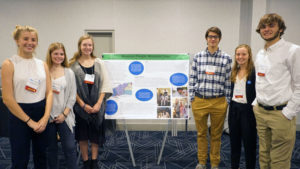By Elizabeth McRae and Alex Macaulay, Department of History, Western Carolina University
This article appeared in the Volume 1, Issue 3 Winter 2020 issue of the Appalachian Curator. Click here to view a PDF of the full issue.
For the past five years, history faculty at Western Carolina University in Cullowhee, NC, have collaborated with students at a local high school on the Mountain People, Mountain Lives Oral History Project. Beginning each January, Drs. Elizabeth McRae and Alex Macaulay conduct a series of workshops, preparing students at Smoky Mountain High School to research, organize, and conduct oral interviews with a wide range of local people. In May, the participants scatter throughout their small mountain community to record and conserve the memories of men and women from multiple backgrounds with a multitude of experiences. To date, forty-eight students have conducted seventy-five interviews. Fifty-four of these have been transcribed with audio and transcripts available via Western Carolina University’s Hunter Library website (https://tinyurl.com/mountainlives). The interview subjects cut across class, racial, gender, and generational boundaries as students have recorded the accounts of long time residents, recent immigrants, African Americans, Latinos, farmers, nurses, preachers, teachers, veterans, entertainers, activists, and professional athletes. They sat and listened as interviewees from the ages of twenty-five to ninety-six shared the broad experiences of Appalachian women and men who fought in wars, danced at Woodstock, and struggled through hard times.

These interviews preserve the unique memories, traditions, lives, stories, and customs of men and women who have made history, but do not always show up by name in history books or history classes. As part of this process, the participants come to appreciate not only the complexity and diversity of history, but of their surrounding community as well. It reminds some and reveals to others that friends, families, neighbors, and themselves are part of a much larger world with members who have shaped and are shaped by historical forces. They come to realize and appreciate that big stories happen in small places, which expands their view of the world, their Appalachian community, and their own place in each.
Early on, the students recognize the responsibility they have to not only the people they speak with, but to the larger community as well. Interviewers and interviewees alike know that their contributions mean a great deal to the men and women who live and work here, but they also understand that their recorded conversations have and will play a role in many people’s current and future perceptions of Appalachian people and culture. In this regard, this project emphasizes that Appalachian lives are both rooted in their place and shaped by national and international experiences. For academics and participants alike, it promotes a substantial reimagining of Appalachia and its inhabitants, from a region and people traditionally defined primarily by their isolation to a potentially boundless place with an identity not limited by geography, race, religion, class, politics, sexuality, or nationality.